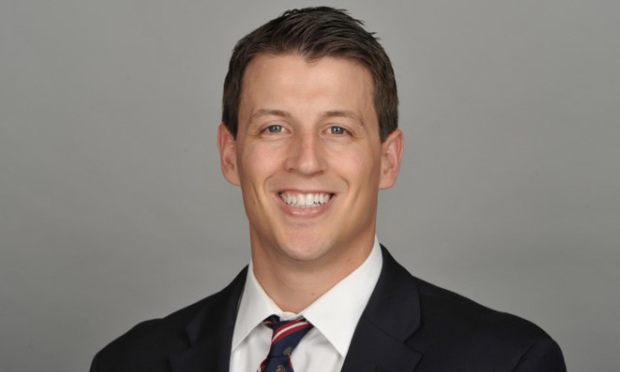'Janus' is the Greek God of Transitions and Transitions Are Coming Fast in Calif.
The overturning of Abood will reverberate through the labor industry for years to come, with the first affects already being seen.
July 12, 2018 at 01:00 PM
6 minute read
 Colin Calvert.
Colin Calvert.
California has the largest number of union members of any state living within its borders, and the recent June 27 decision from the U.S. Supreme Court will have immediate and future consequences. In 2016, it was California's public unions on the nation's stage, when Friedrichs v. California Teachers Association brought the issue of “agency fees” (fees paid as nonmembers for nonpolitical running of the union) before the Supreme Court. With the unexpected passing of Justice Antonin Scalia, the court deadlocked and affirmed the Ninth Circuit's holding that Friedrichs was rightfully controlled by Abood and the questions presented in the appeal were “so insubstantial as not to require further argument, allowing agency fees to continue to be collected from union nonmembers.”
Illinois and Janus Rise Before the Court
Justice Samuel Alito has been signaling for years that he is ready to overturn the 41-year-old case Abood v. Detroit Board of Education that allows public unions to collect agency fees from nonmembers. Enter Illinois and Janus v. American Federation of State, County, and Municipal Employees, Council 31. The plaintiff, Mark Janus, disagreed with how the union was bargaining in light of the state's fiscal crisis. Even though Janus disagreed with the union, he still had to pay an “agency fee.” Janus sued, arguing that being forced to pay the agency fee was against his right to free speech. According to Janus, being forced to fund the union was the same as compelled speech.
With Alito writing the majority opinion, the court overturned Abood. Pulling no punches, the court immediately states the 41-year-old decision was “poorly reasoned.” Previously, union membership was automatic, and those who chose to opt-out of the union had agency fees deducted from their pay with or without their consent. Effective immediately, public unions are not permitted to take agency fees, and members must now “opt into” union membership.
Friedrichs Sues Again, and Other Calif. Effects
In California, effects from the decision are already being seen. In preparation for the anticipated holding, the California Teachers Association slashed more than $20 million dollars from its budget. Friedrichs and six other plaintiffs have filed a class action to claw back the union agency fees they paid. Similar cases are being filed throughout the country and can be expected to continue. In New York, Gov. Andrew Cuomo signed legislation in preparation of Janus that permits unions to deny certain benefits to nonpaying members, such as representation at grievance or termination hearings.
In fact, the Supreme Court hinted at legislation being a possible response to the Janus decision. In response to the potential benefit to nonmembers of disciplinary matter representation, the court specifically noted “[i]individual nonmembers could be required to pay for that service or could be denied union representation altogether.” A footnoted reference to California's own Cal.Gov.Code Section 3546.3, which gives a religious exemption to employees who object to paying union dues on the basis of their religious beliefs. The statute also permits the union to charge these individuals for arbitration or grievance representation, since the conscientious objectors are exempt from agency fees.
In the immediate future, expect more agency fee “claw back” suits in the 22 states—including California—that did not previously forbid agency fees. The success of these suits is yet to be seen. It is also reasonable to anticipate further legislation across the United States that will further codify the court's acceptance of reduced representation for nonmembers.
As to California, the state Legislature continues to move forward with other “Union Protection” bills. Senate Bill 1085 seeks to add protection to union shop stewards on leave. Assembly Bill 1937 will require agencies to follow the union dues collection agreements in the contract, including for termination of union membership and withholding of dues (termination of membership is often available only during a yearly 10-15 day period). Assembly Bill 2049 will grant the unions of school and community college employees five days to review a member's request to separate from the union and to speak with and potentially retain the member.
Other proposed bills could involve giving permission to union representatives to meet with new employees during orientation, permission to give names and email addresses of new and current employees to union representatives, and more freedom for shop stewards to conduct union business.
Union leadership will also go head-to-head with anti-union organizations. Union leadership is pushing to retain membership, and the anti-union organizations have already been contacting public sector employees about the new Janus decision with information on how to terminate their membership.
In California, according to the Bureau of Labor Statistics, 2,491,000 employees are members of a union, with 217,000 covered by a union and not paying dues. This includes members of both private and public unions. Public sector employees make up 58 percent of the unions members in California. While it is unclear exactly how many of those employees are individuals who will go from paying agency fees to no fees, unions are anticipating a drop in membership. No one is able to say for certain what will happen to unions going forward, as research on the effect of right-to-work legislation is often politicized and hard to quantify, but it is clear that right-to-work states do have lower rates of union membership.
The overturning of Abood will reverberate through the labor industry for years to come, with the first affects already being seen. Predicting exactly how it will affect the labor force is like looking in a broken crystal ball—there are too many ways in which unions can transition and change. The only thing certain is that transitions and changes are coming.
- https://www.bls.gov/news.release/pdf/union2.pdf
- Id. at 7.
- Id. at 5.
- https://www.the74million.org/article/the-california-teachers-association-slashes-budget-by-more-than-20-million-ahead-of-janus-supreme-court-ruling-expects-to-lose-23000-members/
- http://www.abajournal.com/news/article/lawsuit_to_clawback_union_dues_filed_after_janus_decision
- https://www.governor.ny.gov/news/governor-cuomo-signs-legislation-protect-rights-new-yorks-working-men-and-women
- Janus at 14
- https://www.sacbee.com/news/politics-government/the-state-worker/article212386229.html
- https://www.bls.gov/regions/west/news-release/unionmembership_california.htm
- http://laborcenter.berkeley.edu/union-effect-in-california-1/
- https://www.nytimes.com/2018/06/27/business/economy/supreme-court-unions-future.html; https://www.theatlantic.com/politics/archive/2018/06/janus-afscme-public-sector-unions/563879/
- https://www.npr.org/2015/03/27/395698481/examining-right-to-work-laws-impact-on-income-and-economic-growth
Colin Calvert is a partner in the Irvine office of Fisher & Phillips. He can be reached at [email protected].
This content has been archived. It is available through our partners, LexisNexis® and Bloomberg Law.
To view this content, please continue to their sites.
Not a Lexis Subscriber?
Subscribe Now
Not a Bloomberg Law Subscriber?
Subscribe Now
NOT FOR REPRINT
© 2025 ALM Global, LLC, All Rights Reserved. Request academic re-use from www.copyright.com. All other uses, submit a request to [email protected]. For more information visit Asset & Logo Licensing.
You Might Like
View All

California’s Workplace Violence Laws: Protecting Victims’ Rights in the Workplace
6 minute read

'Nothing Is Good for the Consumer Right Now': Experts Weigh Benefits, Drawbacks of Updated Real Estate Commission Policies
Trending Stories
- 1'It's Not Going to Be Pretty': PayPal, Capital One Face Novel Class Actions Over 'Poaching' Commissions Owed Influencers
- 211th Circuit Rejects Trump's Emergency Request as DOJ Prepares to Release Special Counsel's Final Report
- 3Supreme Court Takes Up Challenge to ACA Task Force
- 4'Tragedy of Unspeakable Proportions:' Could Edison, DWP, Face Lawsuits Over LA Wildfires?
- 5Meta Pulls Plug on DEI Programs
Who Got The Work
Michael G. Bongiorno, Andrew Scott Dulberg and Elizabeth E. Driscoll from Wilmer Cutler Pickering Hale and Dorr have stepped in to represent Symbotic Inc., an A.I.-enabled technology platform that focuses on increasing supply chain efficiency, and other defendants in a pending shareholder derivative lawsuit. The case, filed Oct. 2 in Massachusetts District Court by the Brown Law Firm on behalf of Stephen Austen, accuses certain officers and directors of misleading investors in regard to Symbotic's potential for margin growth by failing to disclose that the company was not equipped to timely deploy its systems or manage expenses through project delays. The case, assigned to U.S. District Judge Nathaniel M. Gorton, is 1:24-cv-12522, Austen v. Cohen et al.
Who Got The Work
Edmund Polubinski and Marie Killmond of Davis Polk & Wardwell have entered appearances for data platform software development company MongoDB and other defendants in a pending shareholder derivative lawsuit. The action, filed Oct. 7 in New York Southern District Court by the Brown Law Firm, accuses the company's directors and/or officers of falsely expressing confidence in the company’s restructuring of its sales incentive plan and downplaying the severity of decreases in its upfront commitments. The case is 1:24-cv-07594, Roy v. Ittycheria et al.
Who Got The Work
Amy O. Bruchs and Kurt F. Ellison of Michael Best & Friedrich have entered appearances for Epic Systems Corp. in a pending employment discrimination lawsuit. The suit was filed Sept. 7 in Wisconsin Western District Court by Levine Eisberner LLC and Siri & Glimstad on behalf of a project manager who claims that he was wrongfully terminated after applying for a religious exemption to the defendant's COVID-19 vaccine mandate. The case, assigned to U.S. Magistrate Judge Anita Marie Boor, is 3:24-cv-00630, Secker, Nathan v. Epic Systems Corporation.
Who Got The Work
David X. Sullivan, Thomas J. Finn and Gregory A. Hall from McCarter & English have entered appearances for Sunrun Installation Services in a pending civil rights lawsuit. The complaint was filed Sept. 4 in Connecticut District Court by attorney Robert M. Berke on behalf of former employee George Edward Steins, who was arrested and charged with employing an unregistered home improvement salesperson. The complaint alleges that had Sunrun informed the Connecticut Department of Consumer Protection that the plaintiff's employment had ended in 2017 and that he no longer held Sunrun's home improvement contractor license, he would not have been hit with charges, which were dismissed in May 2024. The case, assigned to U.S. District Judge Jeffrey A. Meyer, is 3:24-cv-01423, Steins v. Sunrun, Inc. et al.
Who Got The Work
Greenberg Traurig shareholder Joshua L. Raskin has entered an appearance for boohoo.com UK Ltd. in a pending patent infringement lawsuit. The suit, filed Sept. 3 in Texas Eastern District Court by Rozier Hardt McDonough on behalf of Alto Dynamics, asserts five patents related to an online shopping platform. The case, assigned to U.S. District Judge Rodney Gilstrap, is 2:24-cv-00719, Alto Dynamics, LLC v. boohoo.com UK Limited.
Featured Firms
Law Offices of Gary Martin Hays & Associates, P.C.
(470) 294-1674
Law Offices of Mark E. Salomone
(857) 444-6468
Smith & Hassler
(713) 739-1250






